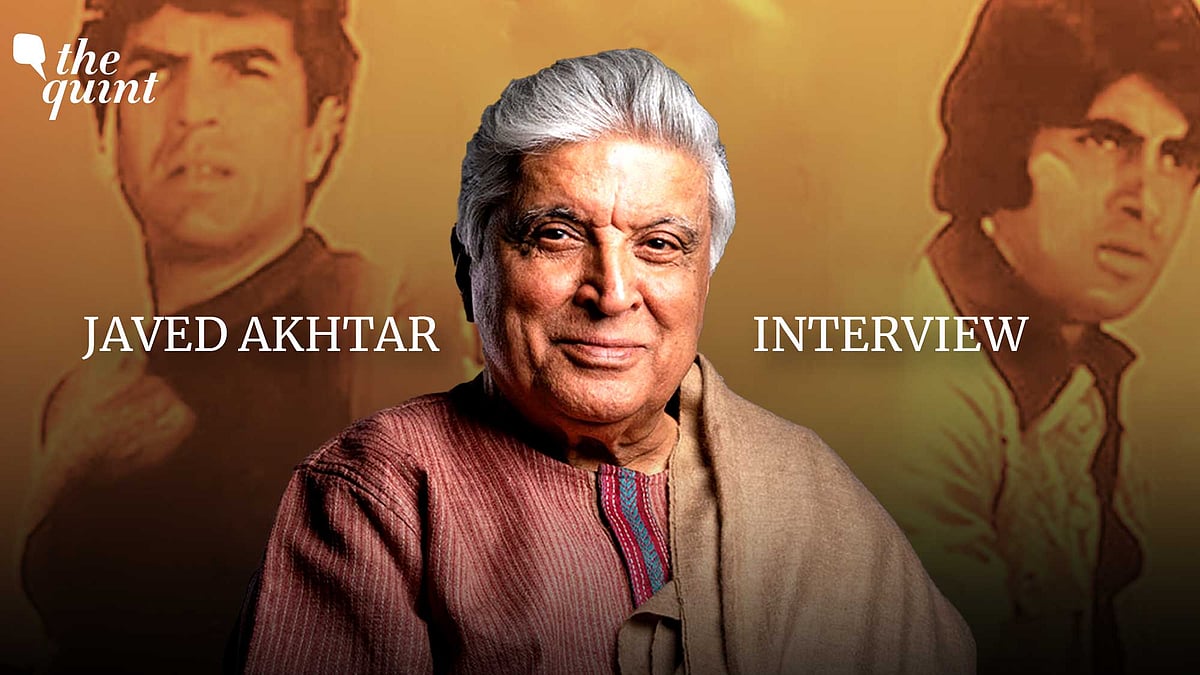Javed Akhtar Interview: 'The World Thought Sholay Would Fail. We Didn't'
Javed Akhtar speaks to The Quint on the writing process of Sholay, half a century on.

advertisement
You can’t think of iconic Bollywood films without thinking of Sholay. On 15 August 2025, the movie completes 50 years of being released, watched, loved, and quoted across generations.
Javed Akhtar, who co-wrote Sholay with Salim Khan, speaks to senior journalist Harinder Baweja about what makes the film one of Indian cinema’s most enduring classics.
Edited excerpts from the interview:
How did you even start to write the script? It has so many characters, so many moments, so much drama, so much tragedy, so much action.
When you start writing any script or any idea, it is what is called the germ of an idea, and then slowly it starts forming, and gradually it grows. As it grows, characters join the story, and gradually it becomes bigger and bigger, and ultimately you have a script. So it doesn’t happen that right from the beginning you had everything. Then it won’t be a beginning in the beginning. It is just a small idea, and then it grows—hopefully, it really flourishes—which happened when we were working on this idea, and we had no idea, no idea at all, that it would turn into a multi-starrer.
While working on the script, we started creating characters, and somewhere halfway we realised that there were many characters which could be offered to important actors, known stars. It was not planned to be a multi-starrer at all. We had no idea that it would become so big.
People used to laugh at the way the film was being made, saying, “What happened to Sippy saab? This is not business. How will he ever recover his money the way he’s making this picture?” And that is how it happened.
When you look back 50 years, what about the movie stands out for you personally?
It is one of the films that Salim and I have written together, and thank you very much to the people that still, after 50 years, remember it with such warmth and such love.
Is it true that two-three days after the movie was released, Amitabh Bachchan and the director came to your house thinking that the movie had flopped?
And GP Sippy. Yes, this was the general beliefs in the film industry that the picture has been rejected by the audience, and obviously they also heard that. They put it in too many theatres, so some of the theatres could not go houseful in the second day or third day, and that put some kind of a panic in the film industry, and they believed that the film has flopped.
So they came. We had a meeting, and they said that, "Listen. The fact is that the people are not coming in. The theatres are not full, and we'll have to do something immediately, because the stakes are too high, and perhaps we will have to change Jai's role...he shouldn't die", and so on. They gave some more suggestions.
But Salim saab and me, not for a second both of us lost our nerve. We told them that, please believe us, the picture will not fail. We gave them assurance, and requested them to trust in their product. Not only that, in the same very week, when the film industry had written the epitaph of the film, we gave an ad in all the trade magazines that we, Salim-Javed, guarantee that this film Sholay surely will do more than Rs 1 crore in every major territory. Till that time, no picture had crossed Rs 1 crore.
People laughed, and they made a joke of it. Many of them I don't want to name them but they were very high profile people—important actors, director, and producers. They laughed at our face. But the fact is that ultimately, we were also proved wrong because it did not do one crore. It did more than three crores per territory.
Unlike other actors who’ve played villainous roles, there was a lot of fear, of course, about Gabbar Singh, but there was no loathing. He was evil, yes, but there was no loathing, no hatred. Do you agree or disagree with that?
I think this should be discussed with some group of psychiatrists. I won’t be able to give you a totally satisfying answer, because here was a man who did not have an unhappy childhood, and he was not wronged by society—so he had simply become like this. He was pure evil, and he was quite proud of it.
He was ruthless, self-centered, and boastful, and yet people—particularly children—loved this ruthless, merciless person. Why? This is something… this is actually a topic for psychologists.
I was looking up your social media commentary today, and at your tweets in particular, and one of them caught my attention. It’s a photo, actually, which reads: “Cataract is the 3rd biggest cause of blindness. Religion and politics remain the first two.”
The good thing is that you speak up. But are there moments when you feel hemmed in? You know, when you feel worried about the hate and the bigotry?
I get a lot of hate mail, thankfully from both sides: from bigoted Muslims and bigoted Hindus. So as long as I’m getting abuse from both sides, I feel wonderful, because I feel that maybe I’m saying something right. All the bigots of different hues and colours are uncomfortable, and if they send you hate mail, it’s confirmation that they’re taking note of it, and they think you can make some impact. So you have to be contradicted.
You are not unimportant. They give you—unintentionally—a certain respect and confirmation that yes, you are effective, and we will need to oppose you. That’s wonderful.
Watch the full interview.